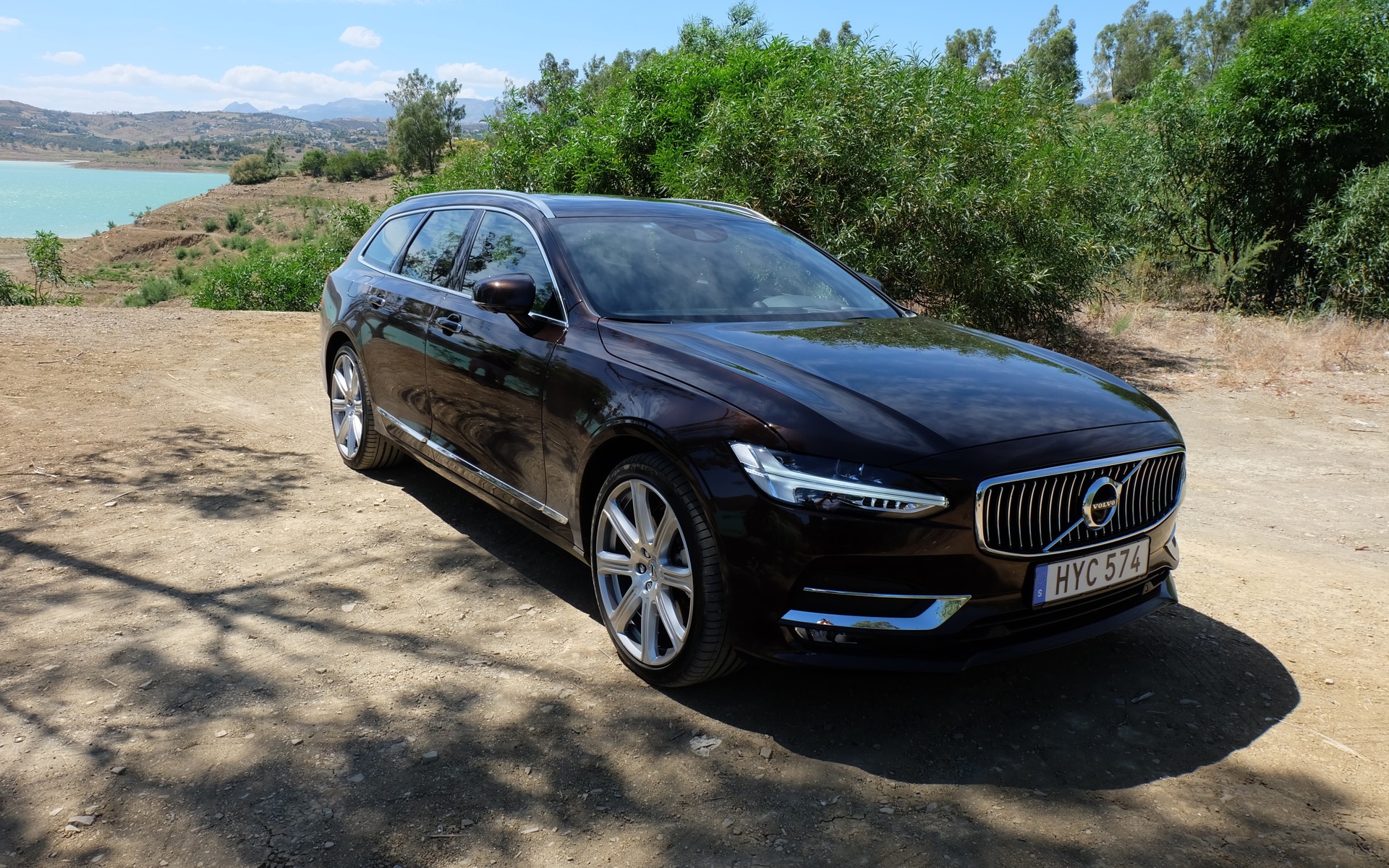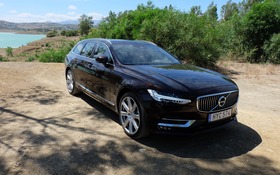2017 Volvo S90 and V90: Two More Swedish Masterpieces

| Strong points |
|
|---|---|
| Weak points |
|
If I say Volvo, what’s the first thing that comes to mind? Perhaps a big, luxurious, comfortable sedan? Or maybe a brown wagon?
Unfortunately, the Swedish brand hasn’t been competitive in this segment for quite some time: its S80 hasn’t been updated since the Cretaceous period and its only wagon, the V60, goes up more against luxury midsize cars than it does full-size cars.
It was against this backdrop that the manufacturer summoned us to Spain, where we were introduced to the S90 sedan and the V90 wagon, two models designed to bring the brand back into the consciousness of luxury vehicle buyers.
Starting on a solid foundation
Both of these models are based on the same platform, known as Scalable Product Architecture (SPA). Shared with the award-winning XC90 SUV, this architecture is fully adjustable and will eventually make its way under other vehicles, like the V90 Cross Country as well as the future 60 series, whose first representative will be the XC60. Next will come the S60 and V60, but I digress.
Mechanically speaking, there’s just one choice under the long hood, a 2.0-litre four-cylinder, the very same engine found in the XC90. The first version that will make its way to our neck of the woods will be the T6. That means that its 1969 millilitre-capacity is supplied with oxygen by a turbo AND a supercharger.
At low speed, the supercharger supplies the engine. It engages immediately and helps generate up to 295 lb.-ft. of torque. Once the tach hits 3000 rpm, the turbo has enough pressure to become useful. A clutch then deactivates the supercharger and the turbocharger takes over, producing up to 316 horsepower. An eight-speed automatic gearbox comes factory standard as does all-wheel drive.
At some point, there will be other options, with a T5 version to be added to the lineup. As on the S60 of the same name, this engine has no supercharger and develops only 250 horsepower. A T8 plug-in hybrid version is also on the way. The numbers are not yet available, but we know that it will feature about 400 lb.-ft. of torque and will be able to go more than 28 kilometres without using a single drop of gas.
The wagon: the ideal family vehicle
Whereas the brand’s previous products didn’t have much in the way of style, recent Volvo products have improved by leaps and bounds. The XC90 SUV won numerous awards and the duo that we’re introducing today is of that same ilk. Both vehicles have a long, wide nose and straight, unembellished flanks. I’m no psychic, but something tells me that this style will age better than some of its rivals’ torturous designs.
The rear of the sedan features large lights that cover a good deal of the trunk; as for the wagon, it has incredible lights loaded with LEDs on the back of its D-pillars. The tail end is also very straight, giving it an impressive loading capacity: no less than 1526 litres, versus 500 litres for the trunk of the sedan.
The passenger compartment of the S90 and V90 is excellent: the little steering wheel is comfortable, all the surfaces are either covered in soft leather, elegant woodwork or high quality rubber, and the storage compartments are numerous (although, strangely, there isn’t one for sunglasses). There’s one problem, however: the steering wheel isn’t power adjustable. That may seem trivial, but having supplementary engines could have helped incorporate an in/out mode that would retract the steering wheel and back up the seat—a function that would be greatly appreciated by those who are less flexible than they once were.
Let’s take a moment to praise Volvo’s seats: they are light-years ahead of what the competition is offering. They are comfy without being soft, supportive without being restraining, swathed in leather that is as smooth as it is nice and have enough settings to accommodate all body types. In the Inscription versions, there’s a massage function in addition to being heated and ventilated.
On the 9.5-inch touchscreen, there are several interesting finds: the audio system interprets music faithfully and can be configured to imitate the acoustics of the Göthenburg concert hall, for example. There are also added applications like Spotify, Android Auto and Apple CarPlay. What’s more, they are now adding a SIM card able to generate a Wi-Fi signal, transforming your Volvo a connection terminal for up to eight devices.
Trust over sportiness
Rather than perfecting his vehicles on a track, Volvo preferred to take the time to look at the way its customers were going to use their car.
Unlike cars like the BMW 5 Series, Audi A6 and Mercedes-Benz E-Class, the steering is not heavy and the suspension doesn’t have ultra-firm settings. Granted, there’s a certain stiffening effect when you engage the Sport mode, but comfort isn’t overly diminished.
But that’s not to say that this tandem isn’t fun to drive. On the contrary, you feel the weight of the vehicle if you try to take on a few successive hairpin turns (especially the wagon, which is heavier), but these Volvos don’t feel like they lack anything. The engine responds well when prompted and has a lot of torque, even at low speed. The sound isn’t exactly captivating, but there’s a pleasant little backfiring between gear changes if you keep the pedal pressed down.
Volvo is a global leader in terms of safety, and the S90 and V90 are both loaded with an avalanche of technology that improves the safety of its occupants. Thus, there’s a veritable army of factory-standard sensors all around its cars: in addition to being able to detect obstacles, pedestrians and vehicles around your car, they can now recognize a large animal—like a deer, a moose or an elk—crossing the road and brake before the driver has time to react. Whether you’re in the forests of Sweden or out in the boonies, this new function could save your life.
The duo’s second improvement concerns the PilotAssist system: just like in the XC90, the device makes driving semi-autonomous. When it’s engaged, it will maintain a given speed (now up to 130 km/h), will slow down if you get stuck behind a Sunday driver and will keep the car in the middle of its lane. You have to trust all this electronic gear—the end result comes very close to completely autonomous driving.
The buyer will have the final say
When Volvo was bought by Geely, we were afraid for its future since we expected that the brand would become but a shadow of its former self.
The Chinese giant surprised us all. Rather than taking over the Volvo brand, it injected funds into its coffers and said: “Build a vehicle that can compete with the Germans on their turf.”
For the S90 and V90, we have two words: mission accomplished.
If you’re in the market for a luxury sedan or you’re planning on buying a wagon in the next little while (the S90 will be available soon while the V90 will arrive around September), go straight to your Volvo dealership. These new vehicles are not only different from what the competition is offering, but they are better in many respects.
Incidentally, in my humble opinion, the V90 wagon is easily the nicest-looking car currently on the market.











